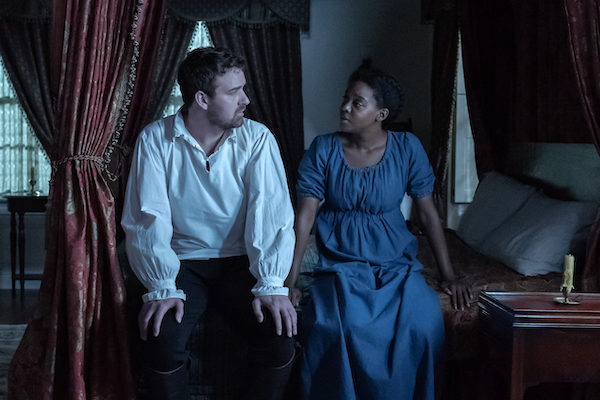Television Review: “Kindred” — More than a Mystery
By Sarah Osman
In this adaptation for Hulu, Octavia E. Butler’s hybrid sci-fi novel has been reduced to a misguided time travel mystery.

Micah Stock (left) and Mallori Johnson in a still from Kindred. Photo: Tina Rowden / FX
It was midnight when my friend Libby finished reading Octavia E. Butler’s Kindred, and she called me immediately. She ranted about how much she hated Rufus, one of the greatest villains in modern literature, loved Dana, the heroine, and how sad she was once she had finished the novel. She immediately sought out Parable of the Sower and has continued to devour Butler’s literary catalog.
Such is the power of Butler’s writing, particularly in her most famous novel, Kindred. Some 40 years after publication, the book has been adapted into a TV series. And it turns out to be a somewhat depressing disappointment. Butler’s hybrid sci-fi yarn has been reduced to a misguided time travel mystery. Time travel is a well-worn genre, and for me the conceit works best when it is kept in the background of the story. Time-tripping should not be at the center of the narrative. It’s far more compelling to watch how a modern character adapts to the past (or vice versa) than to watch them struggle to figure out why they are ping-ponging in the first place. Time travel is a plot device in Butler’s novel, a means to explore very human, very political issues. In Hulu’s Kindred it takes center stage, to the drama’s detriment.
The series does share a few similarities with its source material: Dana, a 26-year-old Black woman, keeps inexplicably traveling to a Southern plantation in 1815. Every time she goes back to the period she saves a young boy named Rufus, who is the son of the despicable owner. On some occasions she is only on the plantation for a few moments; at other times she stays there for months.
The original Kindred takes place in the late ’70s, but showrunner (and award-winning playwright) Branden Jacobs-Jenkins has updated the time to 2016. This is defensible: Jacobs-Jenkins wants to remind audiences that race and gender relations remain complex. 2016 might have been a revelatory year in which to set the series, but nothing about the infamous Presidential election or Trump’s heinous campaign is mentioned. We only get hints of racial tension, and they come from Dana’s cartoonish neighbors, two nosy Karens. It’s unclear if these characters are meant to be comic relief or are a comment on race relations. Whatever the intention, it backfires. More time is spent with them than with some of the slaves that Dana meets on the plantation.
In the series, Dana has become a new transplant to Los Angeles. She has sold her grandmother’s brownstone in New York in her quest to become a TV writer. This decision made me question Dana’s intelligence. TV writers live in comfort in New York. Why sell a brownstone in Manhattan, one of the most coveted pieces of real estate in the world? Dana’s aunt and uncle understandably question their niece’s sanity. They are supposed to fill parental roles, but they end up fading into the background. Why are they introduced in the first place?
The next significant change in the series concerns Dana’s relationship. In the novel, she has been married to Kevin, a white man, much to the chagrin of both of their families. During one of Dana’s time-traveling jaunts, she accidentally brings Kevin with her. Kevin is well-meaning, but he’s oblivious to the dangerous threats to Dana. He also remains in the past after Dana returns to the present, which later sets up struggles in the relationship. In the series, Dana has just met Kevin, and they have just started to date when he is thrust into the past with her. They “bond” over their time on the plantation. But seeing Kevin claim Dana as his slave — when he barely knows her — doesn’t have the same emotional impact as it does in the novel. Kevin and Dana team up in an effort to solve the time-traveling conundrum. But Kevin’s concern doesn’t make all that much sense — why is he going along with Dana’s time-jumping? He barely knows her, so why does he believe that being with her is his fate? On top of that, we spend too much time watching Kevin interact with the plantation owners and their guests. It marginalizes Dana’s experience. The result is that the point of the novel is reversed. The lives of the slaves, and the horrors they face, come off as an afterthought when these experiences are just what Butler wanted to underline.
For those who have not read the novel, the series may be of some interest. The acting is solid; the sets and costumes are well done. The plot’s focus on solving the mystery may appeal to those who gravitate toward detective stories. But those who care for Kindred‘s groundbreaking vision would best skip the series. More adaptations of Butler’s work are on the way; let’s hope they learn from Branden Jacobs-Jenkins’s mistakes.
Sarah Mina Osman is a writer residing in Wilmington, NC. In addition to writing for the Arts Fuse, she has written for Watercooler HQ, Huffington Post, HelloGiggles, Young Hollywood, and Matador Network, among other sites. Her work was included in the anthology Fury: Women’s Lived Experiences in the Trump Era. She is currently a first year fiction MFA candidate at the University of North Carolina Wilmington. When she’s not writing, she’s dancing, watching movies, traveling, or eating. She has a deep appreciation for sloths and tacos. You can keep up with her on Twitter and Instagram: @SarahMinaOsman
Tagged: Black Literature, Branden Jacobs-Jenkins, Hulu, Kindred, Octavia E. Butler
